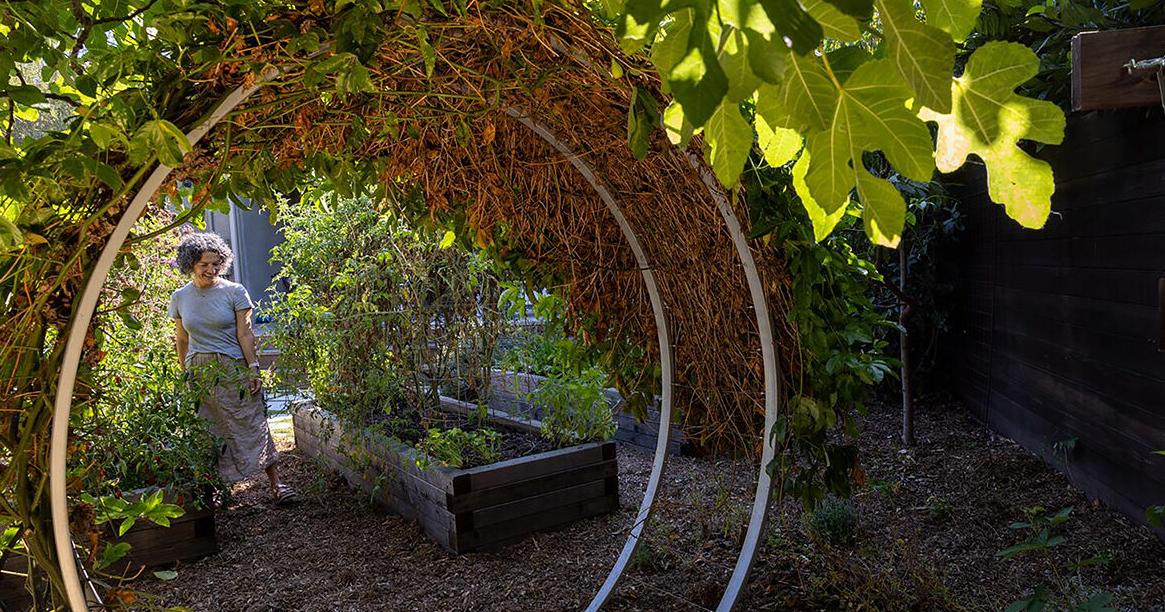Transforming Their Lawn into a Mini-Farm: A Journey of Family and Life Lessons


Transforming Family Lives: How a Pandemic Garden Became a Source of Joy for Angel and Tim Black
LOS ANGELES — As the world wrestled with the challenges posed by the COVID-19 pandemic, many families found themselves navigating uncharted waters. Among them were Angel Black, a psychologist, and her husband, Tim Black, a philosophy professor. Balancing work-from-home obligations with remote learning for their children felt like an uphill battle, but a creative solution was just around the corner.
The pandemic forced families to rethink their living spaces and daily routines, and the Black family was no exception. With both Angel and Tim juggling their professional responsibilities while also supporting their children’s education, the chaos of lockdown life presented a unique set of hurdles. Instead of succumbing to frustration, Angel decided it was time to channel her energies into a project that could bring the family together and, importantly, provide a practical solution to their challenges.
“This is a big food-producing area,” Angel enthusiastically described her vision for their lawn-heavy yard. The idea was straightforward yet ambitious: transform their underused outdoor space into a thriving garden where fresh produce could flourish—an idea that resonated deeply amid grocery store shortages and a rising interest in self-sufficiency.
Angel set out to create a sanctuary right in her own backyard. Envisioning a place where her kids could freely wander and graze, she decided to grow the fruits and vegetables they loved—and which were increasingly harder to find on store shelves during the pandemic. Gardening often brings peace and joy, but it also acts as an educational tool for children, teaching them about growth, patience, and the value of hard work.
As the initial seeds were planted, the transformation of their outdoor oasis began. With time, the garden evolved not only into a source of sustenance but also a space for joyful family bonding. “I wanted it to be a place where the kids could learn about nature, enjoy the sunshine, and understand the importance of growing their own food,” Angel shared. The act of gardening became a family affair; Tim, despite a demanding academic schedule, jumped into the labor and enthusiasm, sharing teaching moments and quality time with the children amidst the rows of budding vegetables.
Apart from veggies, Angel also cultivated herbs, flowers, and even some experimental plants. This diversity brought even more color and engagement to the backyard project, as the family embarked on a culinary adventure exploring new flavors and dishes. The garden served as both a visual feast and a practical solution to feed the family during difficult times. Children often joined their mother in the garden, learning about various plants, tending to them, and eagerly anticipating the harvest. “They were excited every time they spotted new growth or when it was time to pick something,” she recalled with a smile.
This lifestyle change was not only beneficial for the family’s diet but also provided a much-needed respite from the everyday stresses of the pandemic. Spending time in nature has been linked to improved mental health, and for Angel, tending to the garden provided a therapeutic outlet for her own pressures as a psychologist navigating the compounded stress of her profession during unprecedented times.
Moreover, the rising trend of urban gardening sparked at-home agricultural movements across various communities, inspiring many households to seek a deeper connection to their food sources. The Black family’s story reflects a broader theme of resilience and adaptability. Families nationwide have turned to home gardening in droves, seeking solace in the soil while promoting sustainable practices that benefit both health and the environment.
As life begins to return to some semblance of normalcy, the Black family plans to continue their gardening endeavors. They’ve learned so much throughout their journey—lessons about food, patience, and teamwork, all while nurturing a closer family bond. Their vegetable patches stand as a testament to thriving even in the face of adversity.
In essence, what started as a remedy for pandemic-induced chaos blossomed into a vibrant tradition that has undoubtedly changed the Black family’s life for the better. For anyone grappling with similar challenges, perhaps a little dirt under your nails is just the remedy you need—whether for fresh produce, mental health, or family togetherness. While the future is ever-evolving, one thing is clear for Angel and Tim Black: their garden will always be a growing symbol of hope, resilience, and family unity.






